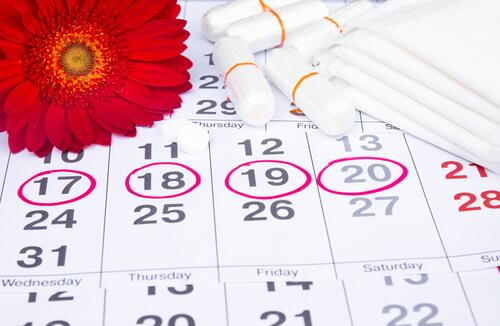Late Periods: Should I Worry?

When your period is late, the first thing that comes to mind is that you’re pregnant. However, that’s only one possibility.
In this article, we’ll tell you when you should go see your doctor or worry if you missed a period.
A Late Period Doesn’t Necessarily Mean You’re Pregnant
Theory dictates that a woman’s menstrual cycle lasts 28 days and that that’s the time that should pass between periods. However, the human body isn’t a robot nor a clock, so women can get their period sooner or later than that.
Our body’s functioning is linked to several systems, which work together like a well-oiled machine. Therefore, the immune, metabolic, circulatory, hormonal, and neuroendocrine systems must be in perfect condition for the menstrual cycle to last exactly four weeks.
If you don’t get your period on time, you may feel worried, or even excited that you might be pregnant. Pregnancy is the most known cause of late periods, but it isn’t the only one. Other factors may also affect timing.
See also: Why Did I Get Two Menstrual Periods in One Month?
What are the Main Causes of Late Periods?
We’ll start with the factors that trigger late periods that shouldn’t worry you. However, you should pay attention to make sure they don’t repeat in the future.
-
Stress and Anxiety

Nowadays, women are under a lot of pressure (at a working and social level) that affects their health. While it’s ‘normal’ for stress to alter the menstrual cycle, this isn’t ideal.
Perhaps you’re going through something that’s altering your period. The anxiety prior to a wedding, a trip, or a big move or the stress of final exams, obligations, or financial situations can directly impact your hormone production.
In these cases, your period will only be a few days late or will come once you solve your problem. It shouldn’t be a sign of other problems, but see your gynecologist just in case.
-
Changes in Body Weight
You may notice changes in your period, as well as delays, if you’ve lost or gained a lot of weight. You should know that adipocytes (fat cells) play a role in hormone production and they can put your cycle out of whack.
Obese women produce more estrogen than normal and really thin women produce less. To reverse this problem, you should find out how much you should weigh and strive to reach that target.
-
Breastfeeding

Women who’ve just given birth get their periods several months later. The body has to go back to normal after the drastic hormonal change it went through during pregnancy and the postpartum period.
Some mothers even get their periods a year or more after giving birth. If this happened to you, you should check with your doctor to find out what’s up.
Take a look at this article: Tips for Beautiful Breasts
-
Going Off Birth Control
If a woman takes the pill, her periods will be regular. However, when she stops taking them for some reason, her body must work naturally again, meaning that the ovaries need to work on their own.
This can delay her ovulation and, consequently, her period. It’s normal for this to happen once. However, you should go see your doctor if you don’t get your period for a second month straight.
Causes of Late Periods That Require Medical Treatments

However, in some cases, late periods may be linked to more serious health conditions or require specific medical attention. This doesn’t mean you should worry or think negatively. Instead, seek professional help to deal with the possible issue, such as:
-
Infections and Diseases
Some common diseases such as influenza, cystitis, and tonsillitis can disrupt the menstrual cycle, especially if you’re taking medicine to treat them.
-
Thyroid Gland Issues

An overactive or underactive thryoid gland can cause many imbalances, including late periods.
You must get a checkup to find out what treatment you need, such as: medications, iodine intake, or even removal of the gland.
-
Polycystic Ovary Syndrome (PCOS)
This is an endocrine system-related disease characterized by menstrual cycle disorders and the formation of ovarian cysts. It can lead to infertility in more advanced or untreated cases.
To treat this syndrome, professionals recommend leading a healthier life and losing weight if necessary. Special hormonal preparations are also prescribed, depending on whether the woman wants to get pregnant in the future or not.
You shouldn’t worry if your period is up to five days late since the human body isn’t that accurate. However, longer delays may be signs of a disorder or problem. Once you rule out the ‘normal’ situations that can lead to menstrual changes, go see your doctor.
All cited sources were thoroughly reviewed by our team to ensure their quality, reliability, currency, and validity. The bibliography of this article was considered reliable and of academic or scientific accuracy.
- Fernández-Alonso, A. M.; Cuadros, J. L.; Chedraui, P.; Mendoza, M.; Cuadros, A. M., and Pérez-López, F. R. (2010). “Obesity is related to increased menopausal symptoms among Spanish women”, Menopause Int, 16 (3): 105-110.
- Ganong, W. (2007). Fisiopatología Médica: introducción a la medicina clínica. México, DF: El Manual Moderno.
- Sociedad Española de Ginecología y Obstetricia (2007). Fundamentos de Obstetricia. Madrid: Marte.
- Tortora, G. (2006). Principios de Anatomía y Fisiología. Buenos Aires: Médica Panamericana.
This text is provided for informational purposes only and does not replace consultation with a professional. If in doubt, consult your specialist.








